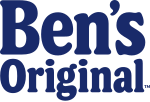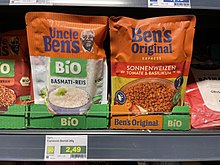Ben's Original
 From Wikipedia the free encyclopedia
From Wikipedia the free encyclopedia
 | |
 Ben's Original and Uncle Ben's packages | |
| Product type | Rice |
|---|---|
| Owner | Mars, Incorporated |
| Country | United States |
| Introduced | 1943 |
| Markets | Worldwide |
| Website | bensoriginal |
Ben's Original, formerly called Uncle Ben's, is an American brand of parboiled rice and other related food products that were introduced by Converted Rice Inc., which is now owned by Mars, Inc. Uncle Ben's rice was first marketed in 1943 and was the top-selling rice in the United States until the 1990s.[1] In 2020, it was rebranded as "Ben's Original" in the US.[2]
History[edit]
In the 1910s, the German-British chemist Erich Huzenlaub (1888–1964)[3] and the British chemist Francis Heron Rogers invented a form of parboiling designed to retain more of the nutrients in rice, now known as the Huzenlaub Process. The process entailed vacuum drying the whole grain, then steaming, and finally, vacuum drying and removal of the husk.[4][5] This increased the rice's nutritional value, reduced cooking time, and made it resistant to weevils.[4]
In 1932, Forrest Mars Sr. moved to the United Kingdom with a remit to expand the Mars food company internationally.[6] While in the United Kingdom, Mars learned of Erich Huzenlaub's work with rice. Huzenlaub's London-based company was Rice Conversion Ltd.[7] The two eventually formed Mars and Huzenlaub[8] in Houston, Texas, which gave Forrest Mars partial ownership of the Huzenlaub Process rice conversion patent. In 1942, through Mars's guidance and sponsorship, Huzenlaub created, together with Houston food broker Gordon L. Harwell, the company Converted Rice, Inc., which sold its entire output to the U.S. and British armed forces. The advantage of this product was that it could be air-dropped to troops in the field without the risk of weevil infestation, and it could be cooked more quickly than other rice products. Additionally, the converted rice product would retain more nutritional value.[9] In 1944, with additional financing from the Defense Plant Corporation and an investment by Forrest Mars, it built a second large plant.[10] In 1959, Forrest Mars purchased Erich Huzenlaub's interest in the company and merged it into his Food Manufacturers, Inc.[11]
Uncle Ben's milling plant was on the Houston Ship Channel until 1999 when it moved to Greenville, Mississippi.[12][13]
Marketing[edit]

From 1946 to 2020, Uncle Ben's products carried the image of an elderly African-American man dressed in a bow tie, which is said to have been based on a Chicago maître d'hôtel named Frank Brown[14][15] with the name "Ben" being a possible reference to a shrewd rice farmer from Houston.[16] In 2020, Mars told Ad Age, "We don't know if a real 'Ben' ever existed."[17] According to Mars, Uncle Ben was an African-American rice grower known for the quality of his rice. Gordon L. Harwell, an entrepreneur who had supplied rice to the armed forces in World War II, chose the name "Uncle Ben's" as a means to expand his marketing efforts to the general public.[18]
In March 2007, Uncle Ben's image was "promoted" to the "chairman of the board" by a new advertising campaign.[19]
In September 2017, Mars, Inc. started to certify the sustainability of basmati rice sold under the Uncle Ben's brand to encourage local farmers to opt for the best agricultural methods.[20]
In the aftermath of the murder of George Floyd, Mars, Inc. announced on June 17, 2020, that it would be "evolving" the brand's identity, including the logo. The move followed just hours after Quaker/PepsiCo changed the name and logo of its Aunt Jemima brand amid accusations of racism.[21][22] As advertised on September 23, 2020, Mars Inc. replaced both the name "Uncle Ben's" along with the brand's historic logo depicting a well-dressed and bald black man in a bow tie; rebranding itself as simply "Ben's Original",[23] with the new packaging becoming widely available in the United States from about June 2021.[24]
References[edit]
- ^ "Wake Up, Mars!". Forbes. 13 December 1999. Retrieved 2024-02-02.
- ^ Wallace, Alicia. "Uncle Ben's has a new name: Ben's Original". CNN. Retrieved October 20, 2020.
- ^ "Geburtsurkunde: Erich Gustav Wilhelm August Louis Huzenlaub" [Birth Certificate of Erich Gustav Wilhelm August Louis Huzenlaub] (in German). Stuttgart. April 7, 1959. Retrieved January 10, 2021.
- ^ a b Kik, M.C.; Williams, R.R. (June 1945). "The Nutritional Improvement of White Rice". Bulletin of the National Research Council (112): 61 ff. Retrieved January 10, 2021.
- ^ British Patents 519,926 (10 April 1940) and 522,353 (17 June 1940); U.S. Patents 2,239,608 (22 April 1941), 2,287,737 (20 December 1941), 2,287,737 (23 June 1942), cited in Kik and Williams
- ^ "History in the Making". Mars, Inc. Retrieved January 10, 2021.
- ^ H.R. Rice Conversion. Rice Conversion Ltd.
- ^ Mars and Hazenlaub Envelope. 1.bp.blogspot.com.
- ^ "Science: Richer Rice". Time. June 28, 1943. Retrieved January 10, 2021.
- ^ "Business & Finance: Rice for G.I.s". Time. August 28, 1944. Retrieved January 10, 2021.
- ^ Mars, Forrest (September 28, 1959). "Correspondence from Forrest Mars to Erich Huzenlaub".
- ^ Perrin, Monica (October 11, 1998). "Uncle Ben's closing old mill, moving operations to Mississippi". Houston Business Journal.
- ^ Drane, Amanda (June 17, 2020). "Houston-based Uncle Ben's to evolve its brand after Pepsi ditches Aunt Jemima". Houston Chronicle. Retrieved July 26, 2020.
The company's headquarters, on Harvey Wilson Drive, stayed behind in Bayou City.
- ^ "Frank Brown (A.K.A. Uncle Ben???)". Morphological Confetti. February 1, 2006.
- ^ Kendrix, Moss H. "The Advertiser's Holy Trinity: Aunt Jemima, Rastus, and Uncle Ben". Museum of Public Relations. Retrieved June 17, 2020.
- ^ "Uncle Ben's logo and symbol, meaning, history, PNG". Retrieved 2023-09-12.
- ^ Wohl, Jessica (October 5, 2020). "Uncle Ben's rebranding falls short, say critics". Ad Age. 91 (19): 3.
- ^ "About". Uncle Ben's. Archived from the original on April 27, 2006 – via Internet Archive.
- ^ Elliott, Stuart (March 30, 2007). "Uncle Ben, Board Chairman". The New York Times. Retrieved April 16, 2007.
- ^ "Uncle Ben's orders up 100 per cent sustainable rice". BusinessGreen. September 22, 2017. Retrieved October 4, 2017.
- ^ Valinsky, Jordan (June 17, 2020). "Uncle Ben's follows Aunt Jemima in move to phase out racial stereotypes in logos". CNN. Retrieved June 17, 2020.
- ^ Lacy, Lisa (June 17, 2020). "Uncle Ben's Vows to Upgrade 'Visual Brand Identity'". Adweek. Retrieved June 17, 2020.
- ^ "Uncle Ben's rice getting new name – Ben's Original". CBS News. The Associated Press. September 23, 2020. Retrieved September 23, 2020.
- ^ Kiner, Deb (12 May 2021). "Uncle Ben's rice is now 'Ben's Original' and available on store shelves in new package". Penn Live Patriot-News.